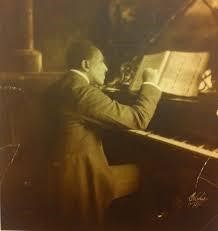Harry Lawrence Freeman
(1869–1954) was the first African American to compose an opera,
adding nearly a score of works in the same genre during a long career as teacher and composer; the first black composer to conduct his own works with a symphony orchestra; and a major player in the Harlem Renaissance. The son of soprano Agnes Sims Freeman, he was born in Cleveland and educated in its public schools, where he learned to sight-read music. At the age of 18, he was inspired to begin composing his own music after attending a performance of Richard Wagner’s Tannhäuser.
His first opera, Epithalia, the first ever written by an African American, was performed at the Deutsches Theater in Denver in 1891; his second, The Martyr, the first opera in the United States to be produced by an all-black production company, premiered at the same theater on August 16, 1893, and was later staged in Chicago and at the German Theater in Cleveland. After composing a third opera, Nada (1898), later retitled Zuluki (scenes from which were performed by the Cleveland Symphony in 1900), Freeman returned to Cleveland to study composition and theory under Johann Beck, who compared Freeman’s musical style to Wagner’s.
Despite this high praise, Freeman could find work only in so-called “race” music. Between 1895 and 1899, he toured with Ernest Hogan’s Rufus Rastus Company and composed some of the music for Hogan’s blackface musical comedies. In 1899, he married Charlotte Louise Thomas, a singer and actress from a prominent black family.

Freeman’s first opera was the first composed by an African
American; his second, the first produced by an all-Black
Production company, was staged in Chicago.
(wikimedia commons)
In 1901 Beck led the Cleveland Symphony Orchestra in excerpts from three of Freeman’s operas, a symphonic debut that garnered the composer a great deal of media attention. He composed several more operas in the years that followed—some twenty in all—including An African Kraal (1903), The Octoroon (1904) and Valdo (1906).
Freeman would himself seek positions that enabled him to promote the cause of African American musical performance and production. From 1902 to 1904, he directed the music program at Wilberforce University. In 1906 both Harry and Carlotta worked at the newly-formed Pekin Theatre in Chicago, the first theater of its kind to be entirely run and performed by African Americans.
In 1908 he moved his family to New York City, where he became the musical director for the Cole-Johnson Brothers Company, then musical director of the John Larkins Musical Comedy Company. In 1912 he founded and conducted the 75 member Negro Choral Society. In 1920 the Freemans founded both the Negro Grand Opera Company and the Salem School of Music in Harlem, later renamed the Freeman School of Music.
The Freemans’ brownstone also served as a gathering place during the Harlem Renaissance for such notables as Marian Anderson and Lena Horne. Inspired by jazz, Tin Pan Alley, early Broadway musicals and vaudeville, Freeman began to incorporate these styles into his own. Excerpts from his operas were widely performed in the city, including at Carnegie Hall.
Voodoo (1914) became the first African American opera presented in New York’s Broadway theater district on 10 September 1928. (Performances of the Act I duet “Oh Radiant Night,” the Voodoo Queen’s Act III aria, Mando’s aria, and Chloe’s aria can be heard on Youtube. See links below.)
In the 1940s, Freeman was working regularly as a concert organizer and conductor and founded the Aframerican Opera Foundation to support African American composers and singers of opera, and was a music critic for the New Amsterdam News.
Harry Lawrence Freeman performed at Carnegie Hall twice during his lifetime, once in 1930 and again in 1947. He also composed and directed a musical event at the 1934 Chicago World’s Fair that showcased the African American experience. In 1930 he received the Harmon Award for significant achievement by an African American in the field of arts and letters. In the late 1940s, Freeman sought to found yet another organization that would promote black composers and singers, the Aframerican Opera Foundation, but his efforts were cut short by his death on March 24, 1954, at age 85.
Freeman published quite a few popular songs, arrangements of spirituals, even some music for the concert hall that included The Loves of Pompeii, a song cycle; My Son, a cantata; The Slave, a symphonic poem; and Salome, a ballet with chorus.
Multiple examples of Freeman’s music can be heard today on YouTube: